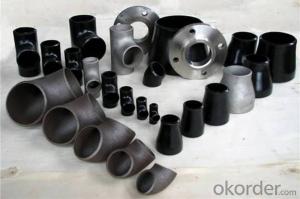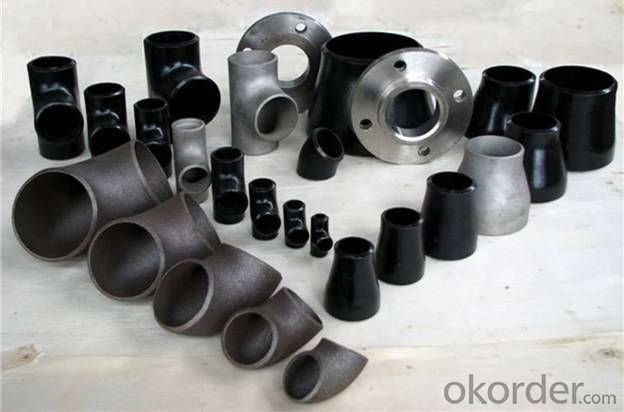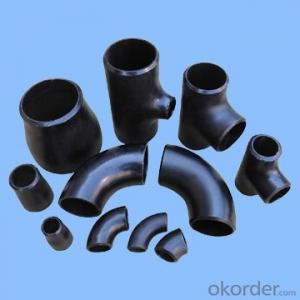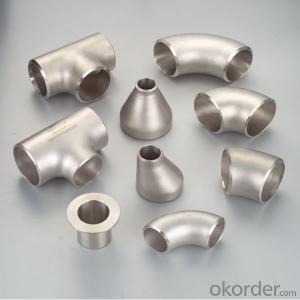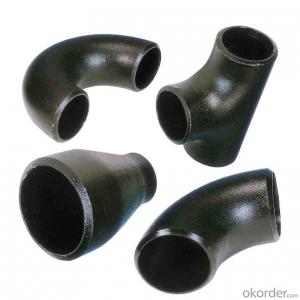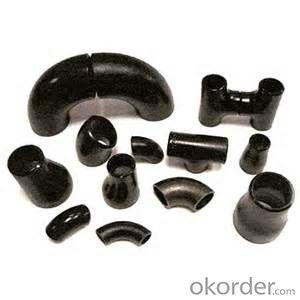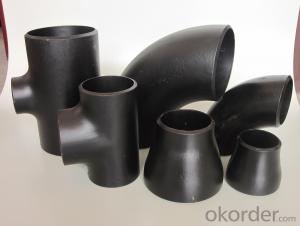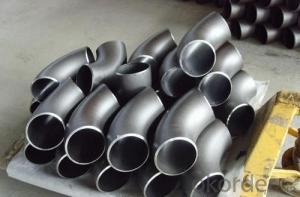4'' carbon steel pipe fittings ISO/ BS EN/DIN/ API
- Loading Port:
- Tianjin
- Payment Terms:
- TT OR LC
- Min Order Qty:
- 5 m.t
- Supply Capability:
- 300 m.t/month
OKorder Service Pledge
OKorder Financial Service
You Might Also Like
Products Detailed Description
Products | pipe fittings elbows, bends,tees, reducers caps |
Size | 1/2" - 48" |
Wall thickness | Sch5-Sch160 XXS |
Standard | ANSI, ASME API5L, OCT, DIN and JIS, etc. |
we can also produce according to drawing and standards provided by customers. | |
Material | Carbon steel, alloy steel and stainless steel. |
We can produce according to materials appointed by consumers. | |
Packaging | Plywood Cases,plywood pallet, plastic bag or as customers requirement |
Surface Treatment | Shot blasted, rust-proof black oil |
Delivery Time | 10-60 days |
Quality | First grade |
Others | 1.Special design available according to your drawing. |
2.anti-corrosion and high-temperature resistant with black painting | |
3. All the production process are made under the ISO9001:2000 strictly. | |
4. A conformity rate of ex-factory inspection of products. |
Specifications
Ansi B16.9 WPB carbon steel pipe fitting elbow tee reducer
Size:Seamless 1/2"-24" Welded 1/2"-48"
ANSI B16.9 WPB carbon steel pipe fitting elbow tee reducer
1.Size: Seamless 1/2"-24" Welded 1/2"-48"
2. WT: SGP, STD, SCH40, SCH80, SCH100,SCH120,SCH160,XS,XXS
3. Material:
stainless steel Grade: 201,304,304L,316,316L,317,317L,904L,and etc
carbon steel Grade: WPB,GRB, Q235,16MN
Alloy steel: st35.8,st52,wp11,wp22,wp12 wp l6
4. Standard: ASTM/AISI/DIN/JIS
5. Type: Concentric and eccentric
6. Surface treatment: Transparent oil, rust-proof black oil
7. Applications range: Applications range: for use in the petroleum, smelting, foodstuff, power, papermaking, chemical, medical equipment,aviation, boiler heat exchanger, and other fields
8. Packing: wooden case or as per customers' requirement
- Q: What are the different methods of transporting steel pipes?
- There are several methods of transporting steel pipes, including by truck, rail, ship, and pipeline. Each method has its advantages and is chosen based on factors such as distance, cost, and accessibility. Trucks are commonly used for shorter distances or when the delivery location is not easily accessible by other means. Rail transport is efficient for long distances and can handle large quantities of steel pipes. Shipping by sea is ideal for international shipments or when the destination is located near a port. Lastly, pipelines are used for transporting steel pipes for oil and gas industries, as they provide a direct and continuous flow.
- Q: What is the difference between hot-rolled and cold-rolled steel pipes?
- Hot-rolled steel pipes are produced at high temperatures and have a rougher surface finish. They are known for their flexibility and are often used in applications that require bending or shaping. On the other hand, cold-rolled steel pipes are produced at lower temperatures and undergo additional processing to achieve a smoother surface finish. They are generally stronger and more precise in dimensions, making them suitable for applications that require high precision and strength.
- Q: What are the thermal properties of steel pipes?
- Steel pipes have excellent thermal conductivity, allowing them to efficiently transfer heat. They also have a high melting point, making them suitable for high-temperature applications. Moreover, steel pipes have a low coefficient of thermal expansion, meaning they can withstand significant temperature changes without warping or deforming.
- Q: Can steel pipes be used for underground heating systems?
- Yes, steel pipes can be used for underground heating systems. Steel pipes are commonly used for this purpose due to their durability, strength, and resistance to corrosion. They can effectively transport hot water or steam to provide heating in underground systems.
- Q: How are steel pipes protected from corrosion in corrosive environments?
- Steel pipes are protected from corrosion in corrosive environments through various methods such as applying protective coatings, using cathodic protection, and employing corrosion inhibitors.
- Q: How are steel pipes used in the construction of tunnels?
- Steel pipes are used in the construction of tunnels for various purposes such as drainage, ventilation, and transportation of utilities. They provide structural support, ensuring stability and strength, while also allowing for the efficient flow of water, air, and other essential resources within the tunnel.
- Q: What are the different types of pipe fittings used with steel pipes?
- There are several types of pipe fittings commonly used with steel pipes, including elbows, tees, reducers, couplings, unions, flanges, and valves.
- Q: How do you measure the diameter of a steel pipe?
- To determine the diameter of a steel pipe, various methods can be employed based on the tools accessible and the required accuracy. Here are several commonly used techniques: 1. Utilizing calipers: The most precise approach involves employing a set of calipers. Expand the calipers to their maximum width and then gradually close them around the pipe until they fit snugly. The diameter of the pipe will be indicated by the measurement displayed on the calipers. 2. Tape measure or ruler: In the absence of calipers, a tape measure or ruler can be employed. Wrap the tape measure or ruler around the pipe's circumference, ensuring a snug fit without excessive tightness. Divide the measurement by pi (3.14) to obtain the diameter. Although this method may not offer the same accuracy as calipers, it can provide a rough estimate. 3. String or flexible tape: Another option is to employ a piece of string or flexible tape. Wrap it around the pipe's circumference and mark the point of overlap. Utilize a ruler or tape measure to determine the length of the marked section. Divide this measurement by pi (3.14) to ascertain the diameter. 4. Implementing a pipe gauge: A specialized tool known as a pipe gauge can be utilized for measuring pipe diameter. It comprises a series of circular holes accompanied by corresponding diameter labels. Simply insert the pipe into the hole that best matches its size, and the label will indicate the diameter. Bear in mind that it is crucial to measure the diameter at multiple points along the pipe to account for any irregularities or inconsistencies. For accurate measurements, it is advisable to take multiple readings and calculate the average diameter.
- Q: How do you remove rust from steel pipes?
- There exist several methods to eliminate rust from steel pipes: 1. Employ a wire brush or steel wool: Initiate the process by vigorously scrubbing the rusted areas with either a wire brush or steel wool. This action will effectively detach loose rust and flakes from the pipe's surface. 2. Administer vinegar or lemon juice: Immerse a cloth or sponge in white vinegar or lemon juice and generously apply it onto the rusted sections. Allow it to remain undisturbed for several hours or, preferably, overnight. The acidic properties of these substances facilitate the dissolution of the rust. 3. Utilize a rust remover or converter: Numerous rust remover products are readily available on the market. Adhere to the product's instructions and apply it to the affected regions. Typically, these solutions transform rust into a water-soluble compound that can be effortlessly rinsed away. 4. Employ a paste comprising baking soda and water: Combine baking soda with water, creating a thick paste. Apply this paste onto the rusted areas and allow it to sit for a few hours. Proceed to scrub the region using a brush or steel wool before rinsing it off. 5. Experiment with a commercially manufactured rust dissolver: Should the aforementioned approaches fail to yield satisfactory results, it may be worth considering the use of a commercial rust dissolver. These products are specifically designed to eradicate rust from various surfaces, including steel pipes. Comply with the manufacturer's instructions accordingly. Kindly remember to equip yourself with protective gloves, goggles, and a mask when handling rust removal products, as they possess corrosive properties and may release toxic fumes. Furthermore, it is advisable to apply a rust-inhibiting primer or paint subsequent to rust removal to prevent future instances of rusting.
- Q: Can steel pipes be used for conveying liquids and gases?
- Indeed, the utilization of steel pipes extends to the conveyance of both liquids and gases. These pipes find widespread application across a multitude of industries, including oil and gas, water supply, plumbing, and industrial processes. Their commendable attributes encompass robustness, longevity, and resistance to corrosion. Consequently, steel pipes possess the capacity to withstand elevated pressure and temperature, rendering them ideal for the transportation of an extensive array of liquids and gases such as water, oil, natural gas, steam, and chemicals. Furthermore, the convenience of welding or threading steel pipes together facilitates effortless installation and maintenance procedures.
Send your message to us
4'' carbon steel pipe fittings ISO/ BS EN/DIN/ API
- Loading Port:
- Tianjin
- Payment Terms:
- TT OR LC
- Min Order Qty:
- 5 m.t
- Supply Capability:
- 300 m.t/month
OKorder Service Pledge
OKorder Financial Service
Similar products
Hot products
Hot Searches
Related keywords
